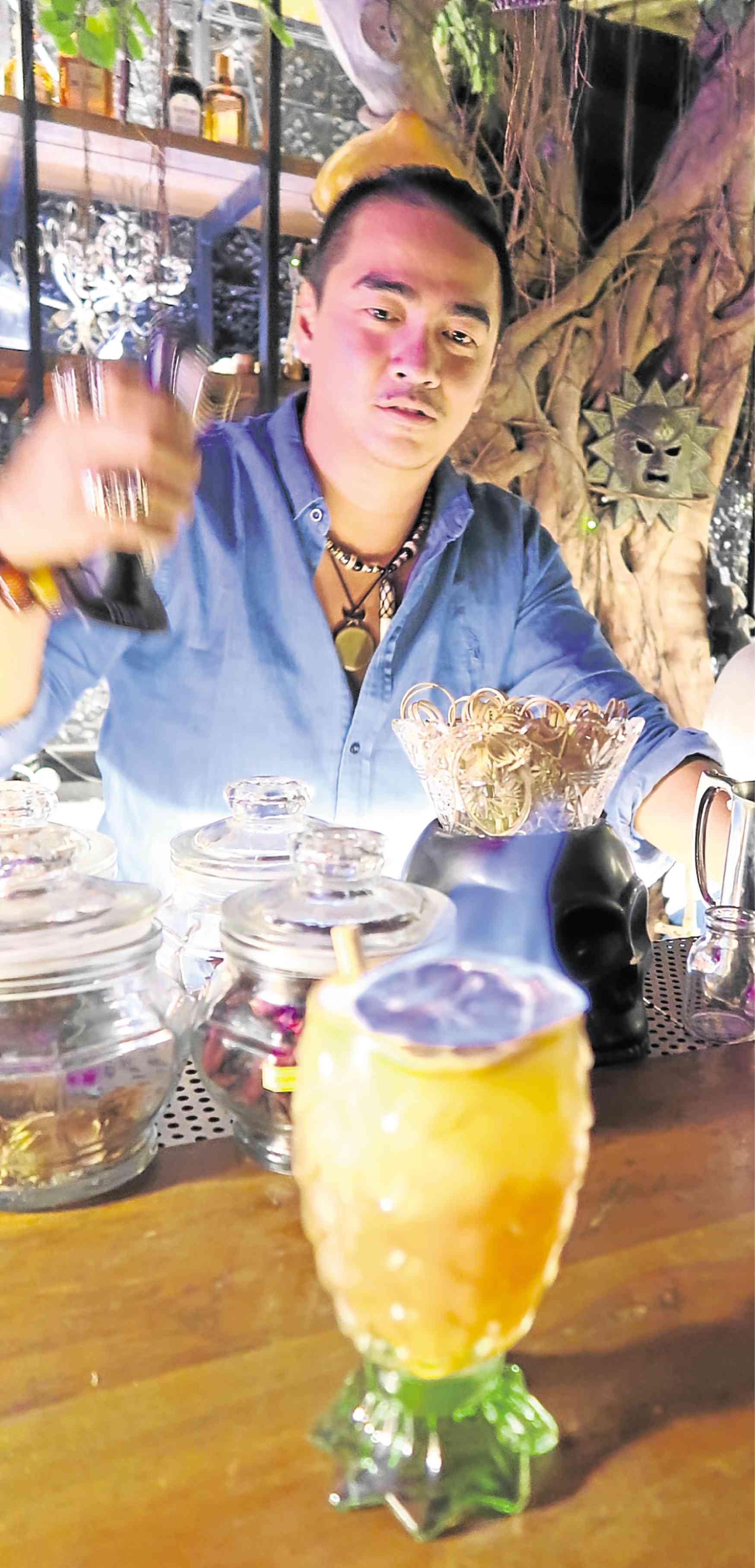It’s not just Manila Mayor Isko Moreno and San Miguel tycoon Ramon Ang, with his Better World project, who are bringing pride to the Tatak Tondo brand these days.
There is another Tondo boy whose star is shining brightly and will shine even brighter in the years to come.
His name is Kalel Demetrio and he is The Liquid Maestro.
A year ago, he partnered with chef Niño Laus to put up Alamat. He calls it a “foraging bar.” Noma’s Rene Redzepi, the Danish chef who popularized foraging, would undoubtedly love this concept.
Kalel calls it a “foraging” bar because he travels and gets the ingredients for all of his drinks himself. And I don’t mean going abroad to purchase olives in the Middle East or vodka in Russia.
By foraging, he means literally going deep into the forests of the provinces of the Philippines to find indigenous ingredients for his drinks.
For example, he has gone hiking in Malay, Aklan, to find ingredients like the blue pea flower that he now uses in the Blue Pea Gin that he makes. He uses muscovado from Bacolod to create Kanto, a salted caramel vodka that is sugar cane-based instead of potato-based.
The guy is a genius.
A few years ago, at Madrid Fusion, I met Kalel when he was creating cocktails for the products of Destileria Limtuaco for a “Mission: Manila” event. But the Tondo boy is an admirable example of tabula rasa and not one experience has gone to waste.
While making a name for himself as the Liquid Maestro, he exposed himself to global trends in concocting cocktails—from flavors to techniques to traditions to cultural idiosyncrasies. What is admirable about him is that this exposure—both local and from distilleries around the world—did not make him pine for the drinks of other countries; instead it made him determined to create his own truly Filipino drinks.
A few years ago, two Australian guys partnered with him to create their own brand of gin. “They came to me because I know some profiles and flavors. Since they were in my turf I told them I can guide them. We went to Malay, Aklan, to forage for ingredients. They ended up buying the land and now we have a distillery there where I host distillery tours,” Kalel explains.
The gin that they created is Sirena Blue Pea Gin, now set to become Asia’s premium gin. Kalel shares that this gin, with its big citrus and floral bursts, won double gold at the Sip awards, the largest consumer choice awards in the spirits industry, in 2018 and 2019.
A trippy touch to the drink is that when you add citrus or tonic water to the drink, the color of the drink turns from “deep ocean blue” to “seductive pink.”
Even better is the Sirena Dry Gin. This one has 11 foraged botanicals including rambutan, which is vapor-infused to create a fruity whole mouth feel. A modern take on dry gin with big citrus bursts, Kalel proudly shares that this won platinum at the Sip awards.
Aside from the gins, Kalel also has Kanto vodka, which was created “to pay homage to the Filipino’s unique tagayan drinking culture” (shots).
Kalel, ever the patriot, has drinks named Diego Silang and Gabriela Silang —PHOTOS BY MARGAUX SALCEDO
It’s not actually vodka in the traditional sense because it is not potato-based and only has 20-percent ABV (alcohol by volume). The drink, which uses sugar cane ethanol and muscovado, has also won double gold at the Sip awards.
Regardless of the award, though, Filipinos will certainly love this for its salted caramel flavor.
At the moment, all of these drinks are available at Agimat, where you can appreciate a glass with their bartenders’ complete tasting notes for each drink and, if you’re lucky, a tribal-inspired dance accompanying the drink’s presentation.
With products like these, I am certain the agimat will work not only for Kalel but for the Philippine liquor industry as a whole, extending to the farmers, laborers and suppliers he supports and inspires.
Not bad for a self-proclaimed Kanto boy proudly from Tondo.
